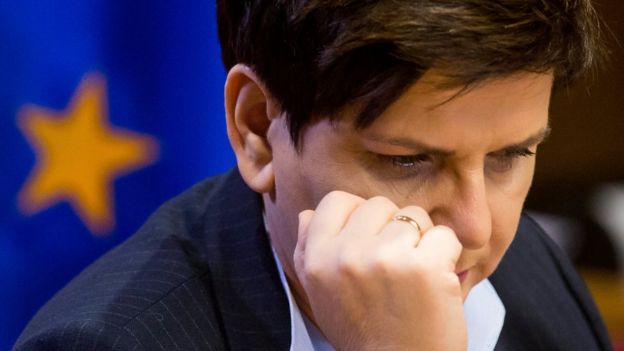This article is more than
7 year oldEU summit: Poland warns against multi-speed bloc
It said it faced new divisions if stronger nations tried to integrate more at the expense of weaker ones like Poland and other ex-communist states.
Friday's talks focused on the future of the post-Brexit EU.
EU members discussed making a joint declaration that should stress EU unity when they meet in Rome on 25 March.

Poland fears being left behind in a multi-speed Europe
But there is new momentum behind the idea of EU members moving at different speeds. France, Germany and Italy back it - but Poland is adamantly against.
Poland and its former communist neighbours fear being left behind if their stronger partners integrate in more areas, especially the eurozone.
Poland is the biggest net recipient of EU funds - in 2015 it got €13.4bn (£11.7bn; $14.2bn) from the EU.
The budget will come under huge strain when the UK - one of the biggest net contributors - leaves.
Brexit 'not the end'
When the 27 EU leaders meet in Rome they will mark 60 years since the launch of the European Economic Community with the Treaty of Rome.
But soon the UK plans to trigger Brexit, the first withdrawal of a member state, a process fraught with risk and uncertainty.
European Commission President Jean-Claude Juncker said: "I don't like Brexit because I would like to be in the same boat as the British.
"The day will come when the British will re-enter the boat, I hope. But Brexit is not the end of the European Union, nor the end of all our developments, nor the end of our continental ambitions."
Under a shadow: Analysis by Kevin Connolly, BBC News

Theresa May was at the summit on the first day
When the idea of an EU celebration of the 60th anniversary of the founding Treaty of Rome in the Italian capital was first mooted it must have seemed like a good idea.
Now Brexit casts a long, dark shadow over those proceedings - an organisation that has known nothing but steady expansion is about to lose a member state for the first time.
That is a confidence-sapping thought for an institution which has no firm timetable for planned future expansion in the Balkans.
There is no big idea on offer from the European Commission - just a palette of five vague outlines of how the EU will work in the future. The moment does not feel right for grand visions.
Then there is the Polish government's anger at the re-election of their fellow-countryman Donald Tusk to a top job at the European Council. Poland - a huge beneficiary of EU funding - suddenly feels as though it might take the place in the European awkward squad that the UK is vacating.
The nationalist Polish government failed to block the reappointment of Donald Tusk as European Council president - a key strategic role in the EU.
It meant there was no consensus. Controversially, the conclusions - normally an expression of EU unity - came instead from Mr Tusk personally.
A long-running feud between him and Jaroslaw Kaczynski - the nationalist guiding the Polish government - caused the debacle.
Over the years, the UK's distance from the EU on many key issues - including the euro, the Schengen passport-free zone and budget spending - has contributed to a de facto multi-speed Europe.
There is a legal mechanism for a smaller group of countries to forge ahead with a common policy.
That was demonstrated again at this summit with agreement that 17 member states could set up a European Public Prosecutor's Office - seen as a way to combat VAT fraud.
Mr Juncker spoke of a multi-speed future as one of the EU's strategic options.
And other centrifugal forces are at work in the EU - how to handle the migrant crisis, resurgent Russian power and the challenge posed by nationalists in many countries.
Euroscepticism is part of wider criticism of the liberal economic order, amid deep inequalities and chronic unemployment in much of Europe.
Keywords
Newer articles
<p>Former CNN host discussed ongoing anti-Israel protests on college campuses</p>
Tiffany Haddish Says Common Is the Only Celebrity She's Been 'Entangled' With, Claims He Chased Her for 2 Years
Rihanna Is “Keeping it Real Simple” for This Year’s Met Gala
Doja Cat steps onto red carpet in lingerie
US Congress threatens ICC over Israel arrest warrants
Israel fears Netanyahu's arrest over Gaza war as international court considers warrant
Kendrick Lamar escalates Drake feud on the scathing diss track, Euphoria
Tucker Carlson releases interview with Russian philosopher Aleksandr Dugin
Tiger’s heartbreaking daughter revelation
Rwanda must halt ‘support’ for M23 rebels, withdraw troops from DR Congo, says Macron
